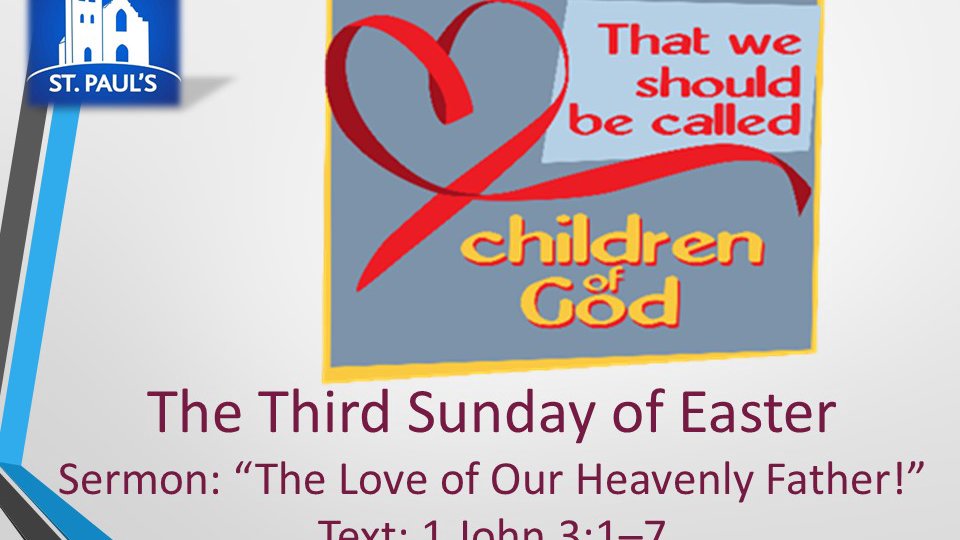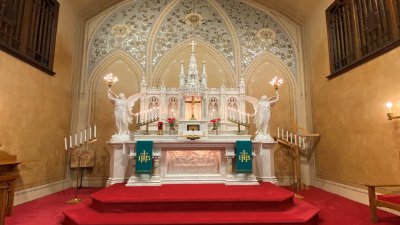Often, a person knows he or she is loved by what is done by another. From the words said, actions shown, and even at times gifts given from parents to children, spouses to each other, friends among one another, and more, we can often sense the motivation of love behind many forms of kindness and care. How can we know God’s love for us? It’s in some ways similar to our earthly relationships, but is from One who always loves perfectly. “See what kind of love the Father has given to us” (1 John 3:1). The Lord speaks His Word of unchanging truth, promise, and hope. He gives the action of sending His one and only Son to this world to live, die, and be raised to life that we may have a new and forgiven life in Him. He gives the gift of His Means of Grace claiming us as His own in Baptism and providing Christ’s body and blood for our forgiveness of sins and nourishment of faith. Unlike love shown in temporal earthly ways, His love is eternal and everlasting and one we are blessed to see with eyes of faith and know in our hearts as we continue in this Easter season, rejoicing in the fact that Christ is risen!

04/18/21 Traditional Service
“The Love of Our Heavenly Father!” Text: 1 John 3:1–7
April 18, 2021 • Rev. Kenny Hsu
04/14/24 Praise Service
April 14, 2024
AS WE GATHER “Amazing” is a commonly used word in the English that has a rich history. It came into common usage in the 14th century as a variant of the older root word “amasod,” which meant stupefied or confounded or overwhelmed with sudden surprise or wonder. The word “amazing” shows up several times in hymns that we sing—from describing the action of God in the birth of Jesus as “love amazing” (LSB 375:1) to bringing to our hearts and minds that in His suffering to pay the price of our sins, our Lord showed “amazing pity” (LSB 437:2). Two other hymns refer to the “amazing grace” of God (LSB 744:1; 558:2), and in another hymn, the author of the text rejoices that God “has done amazing things to me” (LSB 934:2). The season of Easter is a time for us to be truly amazed and filled with the praise of our amazing Lord!
04/14/24 traditional Service
April 14, 2024
AS WE GATHER “Amazing” is a commonly used word in the English that has a rich history. It came into common usage in the 14th century as a variant of the older root word “amasod,” which meant stupefied or confounded or overwhelmed with sudden surprise or wonder. The word “amazing” shows up several times in hymns that we sing—from describing the action of God in the birth of Jesus as “love amazing” (LSB 375:1) to bringing to our hearts and minds that in His suffering to pay the price of our sins, our Lord showed “amazing pity” (LSB 437:2). Two other hymns refer to the “amazing grace” of God (LSB 744:1; 558:2), and in another hymn, the author of the text rejoices that God “has done amazing things to me” (LSB 934:2). The season of Easter is a time for us to be truly amazed and filled with the praise of our amazing Lord!
04/07/24 Traditional Service
April 7, 2024
AS WE GATHER When Thomas finally met Jesus, alive again after Easter, he went from demanding proof to a personal confession of faith, “My Lord and my God.” It would have been a different story had the news been false. The rest of the Jerusalem congregation truly exhibited Easter faith when they became a welcoming community, one that shared with newcomers whatever they needed. The news was unbelievable, but so were the responses—in word and deed as faith saw the freeing truth: we need fear nothing, not even death. We have heard the news as well. How shall we respond?





